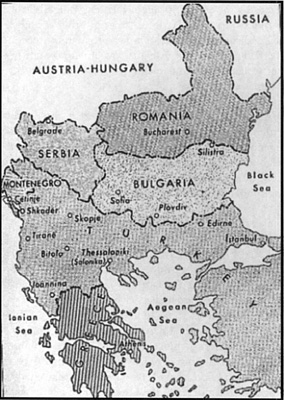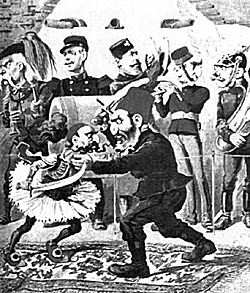 * This article was originally published in the Canberra Games Society's club magazine
'Charge!' and is reprinted here with the kind per mission of the author .
* This article was originally published in the Canberra Games Society's club magazine
'Charge!' and is reprinted here with the kind per mission of the author .
Most people will probably have heard by now of the battle of Kosovo Polje in AD 1389, where Serbian-led forces were defeated by the Ottoman Turks (less widely known is that the Serb side contained considerable numbers of Bosnians and Albanians). This 14th Century battle is an important icon for Serb nationalists, but the much more recent history of Serbia and its neighbours perhaps more important.
Despite numerous setbacks, at the beginning of 1912 the Ottoman Empire continued to hold what is now Albania, northern Greece, and the Former Yugoslav Republic of Macedonia.
A Difficult Birth
After 345 years of subjugation by the Ottoman Turks, in 1804 the Serbs initiated a revolt that by 1815 had Serbia still under Ottoman sovereignty but largely autonomous. As the weakness of the Ottoman armed forces became more apparent (in particular in the Russo-Turkish War of 1828-1829), Serbia gained greater autonomy, and the number of Ottoman garrisons was reduced.
The growing nationalism of the people of the Balkans tested the limits of Ottoman power. In 1876 the Bulgars revolted and were joined by the Serbs in open war against the Turks. Seeing another chance to gain at the expense of the Turks, Russia joined in by again declaring war on the Ottoman Empire in 1877. In the Russo-Turkish War of 1877-78, the alliance of Serbia and Russia soundly defeated the Ottoman forces in the Balkans. Although Turkish resistance prevented a swift Russian victory, the Russians finally advanced to the outskirts of Istanbul (Constantinople).
The 1878 Congress of Berlin recognised Serbian (and Bulgarian) independence, but in effect placed the country under the protection of Austria-Hungary. With Austro-Hungarian support, Serbia declared war on the new state of Bulgaria in 1885, which it sought to subjugate, along with the independent province of Eastern Rumelia (now part of Bulgaria). The Serbs were quickly routed by Bulgarian forces but saved from total conquest by Austrian intervention.
Austro-Hungarian Provocations
In the interests of its own security, Austrian foreign ministers promoted internal discord between Bulgaria, Serbia, Greece and Romania. Serbian relations with Austria deteriorated badly during the so-called Pig War (1905-1907), a customs dispute, and worsened almost to the point of war breaking out in 1908 when Austria-Hungary annexed Bosnia and Herzegovina. Serbia bitterly resented this encroachment.
Russia had agreed to accept and support Austrian annexation of Bosnia-Herzegovina, if Austria supported the opening of the Dardanelles (controlled by Turkey) to Russian warships. Austria, however, reneged on the deal by unilaterally annexing the provinces while leaving Russia without international support for naval access to the Mediterranean.
The First Balkan War
 The Balkans conflict as seen in a contemporary cartoon: little Greece goes to war with Turkey while the other powers seem to be all 'playing their own tune' in the background.
The Balkans conflict as seen in a contemporary cartoon: little Greece goes to war with Turkey while the other powers seem to be all 'playing their own tune' in the background.
The turmoil following the Young Turk revolution of 1908 and the Turko-Italian War of 1911-1912 emboldened the Balkan states to plan a war of conquest against the Ottoman Empire. On March 13, 1912, Bulgaria and Serbia made a secret treaty partitioning the territory of Albania they planned to win. Montenegro started the war against Turkey on October 8, 1912. On October 13, Bulgaria and Serbia issued demands that the Ottoman province of Macedonia be granted autonomy (little more than a pretext for war) and began mobilisation.
The Ottomans declared war preemptively on Bulgaria and Serbia four days later. The next day, Greece also joined the war, not wishing to miss out on its share of territory after the inevitable Turkish defeat. Within six weeks the Turks had lost Skopje to the Serbs and Salonika to the Greeks, and pulled back for the defence of Istanbul. The Turks asked for a truce, and an armistice was signed on December 3.
The Balkan states demanded that the Ottoman Empire give up most of its European territory and pay an indemnity. On January 23, a coup in Istanbul brought an extreme nationalist grouping to power which rejected the terms, and as a result hostilities were resumed within days.
Things continued to go badly for the Turks, who lost Ioannina to the Greeks, Edirne (Adrianople) to the Bulgarians and Scutari to the Montenegrins. Alarmed at the imminent collapse of Turkish power in Europe, and the threat this posed to the European 'Balance of Power', a peace conference was hastily convened. Under the 1913 Treaty of London, Turkey relinquished most of its territory in Europe. It was by this Treaty that Serbia came to control the province of Kosovo-Metohije, now in the news.
The terms of the Treaty created friction between Serbia and Bulgaria. Unfortunately the interference of the major powers took boundary questions and the status of Albania out of the hands of co-conspirators Serbia and Bulgaria and instead referred these issues to an international commission. Bulgaria refused to hand over, in accordance with their prior agreement, portions of Macedonia it held.
Worst of all for Serbia, Albania was made independent by the international commission, and at a stroke the dream of a Greater Serbia with its own access to the sea was extinguished. There were no doubt many Serbs who saw the creation of the Albanian State as a betrayal by the major powers (in particular Austria), with many believing the Albanian state to be an illegitimate apportionment of territory that properly belonged to Serbia by right of conquest. The 1913 commission also excluded from Albania more than half its territory, including Kosovo and Ēamėria, and about 40 percent of its people, leading the Albanians also to feel badly done by.
The Second Balkan War and its Aftermath
On June 1, 1913, Greece and Serbia concluded an alliance aimed at redressing their grievances against the Bulgarians. The Second Balkan War began on June 29. Within the two weeks, Montenegro, Romania, and the Ottoman Empire had all entered the war against Bulgaria. By July 30, Bulgaria, unable to withstand this coalition, sued for peace. By the ensuing peace ag reement, Bulgaria lost considerable territory and, among other things, awarded most of Macedonia to Serbia and Greece. The fledgling state of Albania was effectively under the protection of the major powers and survived unmolested.
By creating a strong and aggrieved Serbia, the peace settlements following the Second Balkan War engendered fear and anti-Serbian sentiment in neighbouring Austria-Hungary. The dismantling of the Ottoman Empire and Bulgaria had removed an important counter-balance to Serbian ambitions.
The Balkan Wars severely strained the alliances between the major powers. Austria-Hungary criticised Imperial Germany for its lack of support, and Russia was resentful of its supposed ally Great Britain, which was implacably opposed to Russian access to the Dardanelles (which would expose British Egypt and India to the Russian navy). To convince their allies of their bona fides, the major powers resorted to much diplomatic sabre-rattling, making the still unresolved rivalry between Austria-Hungary and Serbia (with its ally Russia) extremely dangerous.
On June 28, 1914 the Austrian heir to the throne Archduke Franz Ferdinand and his wife were assassinated by a Serb nationalist in Sarajevo (in recently-annexed Bosnia). The Austro-Hungarian government held Serbia responsible, declared war and in August invaded Serbia. As each side triggered its alliances, the conflict escalated into World War I.
Back to Table of Contents -- Kriegspieler #8
To Kriegspieler List of Issues
To MagWeb Master Magazine List
© Copyright 2000 by Kriegspieler Publications.
This article appears in MagWeb (Magazine Web) on the Internet World Wide Web.
Other military history articles and gaming articles are available at http://www.magweb.com